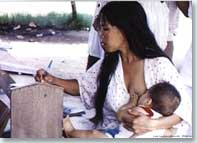 World Alliance for Breastfeeding Action |
|
 World Alliance for Breastfeeding Action |
|
| Women's Health | Declaration for Women's Reproductive and Sexual Rights and Health | |||||||
|
|
| This document: |
|
printable version |
 |
|
The signatories to this Declaration demand that governments ensure access of all women, regardless of age, marital status, race, ethnicity, religion, economic status, ability, and sexual orientation, to:
comprehensive factual information and non-directive confidential counseling
regarding all aspects of reproductive and sexual health and services;
comprehensive, unbiased sexual education;
confidential, accessible and affordable quality reproductive and sexual health
services;
the full range of safe and effective methods of fertility regulation, including
voluntary sterilization, prevention of and treatment for infertility, emergency
contraceptive methods and safe, legal abortion;
comprehensive information and education on STDs/HIV/AIDS prevention
and quality, affordable condoms;
compassionate counselling and treatment for HIV/AIDS and other sexual
and reproductive conditions that incorporate dignity and respect for women's
reproductive self determination;
funding for and gender balance in all aspects of biomedical, behavioral, epidemiological and health research regarding women's health.
Governments must condemn and eradicate any and all coercive laws, policies and
practices regarding sexual and reproductive rights and health, including: forced
sterilization; forced abortion; forced motherhood; forced pregnancy; female genital
mutilation; forced marriage; rape; sexual violence; virginity examinations; forced
contraceptive use; and discrimination on the basis of sexual orientation.
To ensure compliance with these demands, governments should mobilize resources for
women's health, which is defined by the World Health Organization as "a state of
complete physical, mental and social wellbeing, and not merely the absence of disease
or infirmity." Women must be involved at all levels of the decision-making
processes. Therefore, governments must ensure women's involvement on a equal basis at all levels of research and policy design,
implementation, and evaluation. Evaluations must be based on specific goals and time-frames.
|